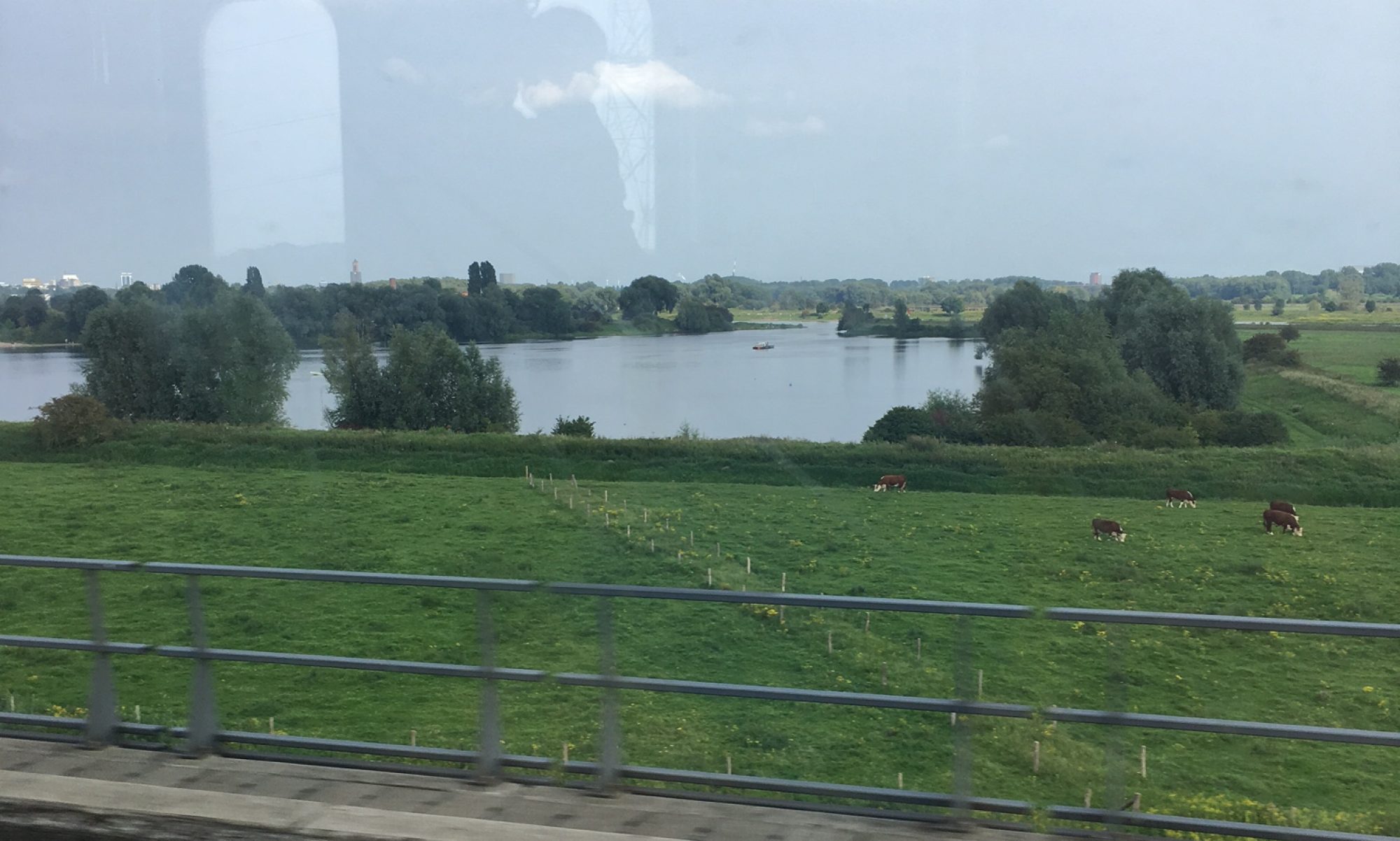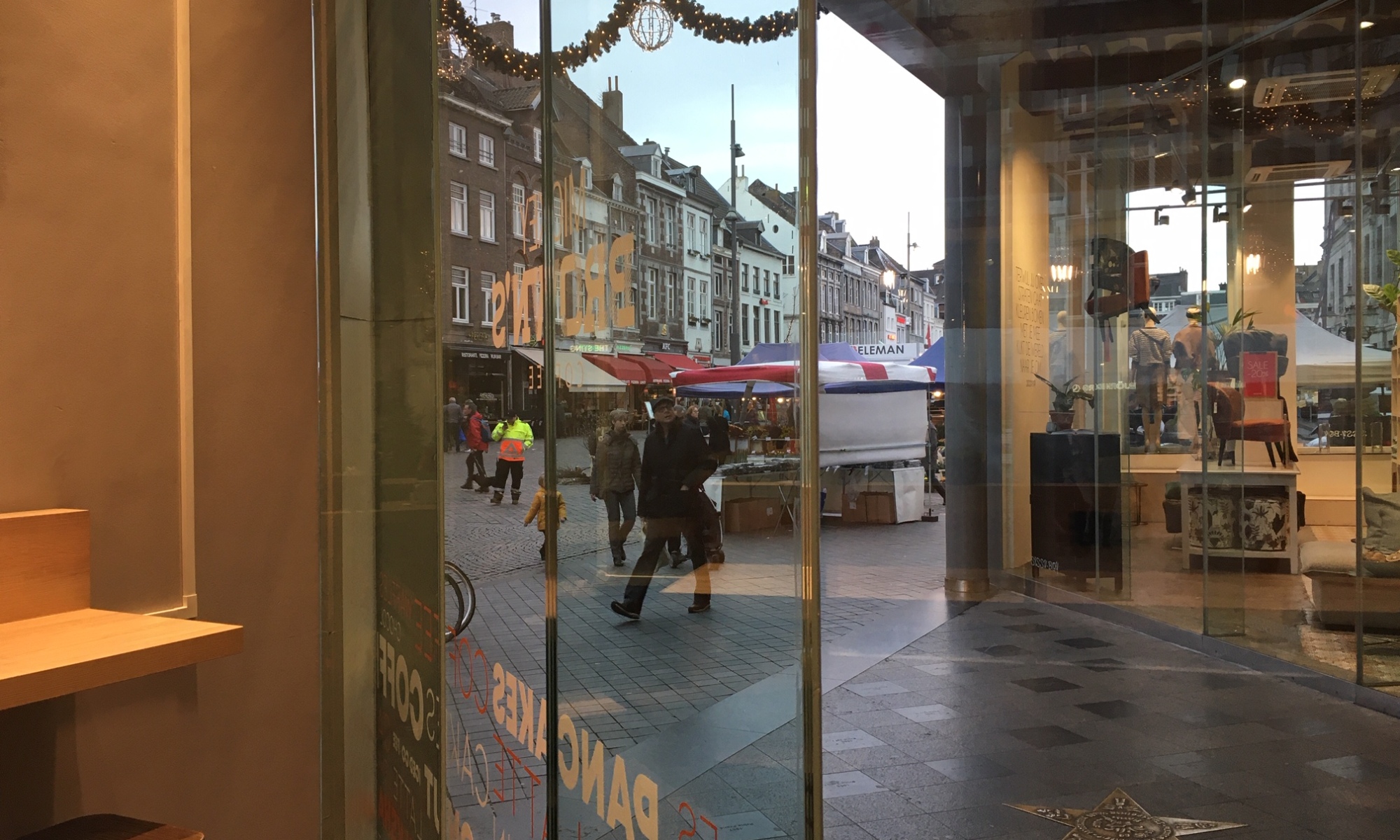I’ve been silent here for awhile, though trying to put together posts on a few things: namely Zwarte Piet, a phenomenon I’m still trying hard to sort out, and the specter of Carnival, which is huge in Maastricht and already quietly polka-thumping its crescendo under the steady pulse of the city, although it’s still more than a month away.
What I’m realizing is that I’ve passed the phase of newcomer noticing, of holding myself at bay as if I’m just an extended visitor, charmed by every tiny part of this experience (although still that is my feeling most days). Instead, we’re all four moving into an era of deeper engagement with the place.
 Here’s my second time ferrying our full-size Christmas tree home by bike.
Here’s my second time ferrying our full-size Christmas tree home by bike.
This is what I had wanted and wished for. When we had to leave the Netherlands 18 months ago, some American friends said things like, “Seems like you found your forever place,” because we expressed loving Arnhem and NL so much. Those expressions struck me as odd – the same language that Americans use to talk about adoptable pets finding their “forever home.” (By contrast, Dutch people were flabbergasted that we loved Holland so much. “But America is so exciting!” I heard over and over as I called to cancel various Dutch utilities before we left. “I’d love to live in America!”)
The truth is that it’s possible to highly regard and deeply romanticize any place where you don’t have to attempt to build a long-term life. Greener grass, the dopamine of constant novelty, imagining yourself a different person, all that. The Elizabeth Bishop poem Questions of Travel is never far from my mind (excerpted, emphasis all mine):
Think of the long trip home.
Should we have stayed at home and thought of here?
Where should we be today?
Is it right to be watching strangers in a play
in this strangest of theatres?
What childishness is it that while there’s a breath of life
in our bodies, we are determined to rush
to see the sun the other way around?
The tiniest green hummingbird in the world?
To stare at some inexplicable old stonework,
inexplicable and impenetrable,
at any view,
instantly seen and always, always delightful?
Oh, must we dream our dreams
and have them, too?
And have we room
for one more folded sunset, still quite warm?
But surely it would have been a pity
not to have seen the trees along this road,
really exaggerated in their beauty,
not to have seen them gesturing
like noble pantomimists, robed in pink.
Not to have had to stop for gas and heard
the sad, two-noted, wooden tune
of disparate wooden clogs
carelessly clacking over
a grease-stained filling-station floor.
(In another country the clogs would all be tested.
Each pair there would have identical pitch.)
Oh must we dream our dreams and have them too?

We didn’t come back to the Netherlands because we were ready to get married to it. That would’ve amounted to the impulsivity of marrying your study-abroad sweetheart (although I know at least two friends from my college study-abroad program in London who did just that). Michael and I together had had a passionate love affair with the Netherlands, and we wanted to come back to try out Real Life. But we’ve both loved and lost before (homes abroad, that is), spending years longing for other places whose real original magic had been situational, temporary, irreplicable. We knew that this time, we needed to find out more concretely what it’s like to really settle in and integrate into this place, which in some ways is quite different from Arnhem. No single year can really tell you what a lifetime (or even decade-long) commitment might be like.
When you choose to live abroad, you will never be from the place you live, no matter how well you might pass. Particularly if you’re not partnered with a native, there will be some questions that people just can’t answer for you – intimate ways of living that you don’t have access to; places you can’t go; ways you can’t merge. Unlike a marriage, where both parties grow towards each other over time, you might change, but the place will not bend towards you. The adaptation – or failure to adapt – is all yours. My Dutch isn’t coming along nearly as fast as I’d like, but I now know when a Nederlander is being kindly direct with me versus being a jerk (it happens, mercifully rarely); how to take up an appropriate amount of social space without being an obnoxious foreigner (most of the time); what basic and intermediate moves are required in transactions and interactions; and how to navigate many of the institutional relationships that are required.
In other words, I am not from here, but I really live here. I still love living here. And I can also see the place more clearly, including the kinds of things that might grate on me over time (though admittedly, little is grating on me just yet except for loneliness). Most of it has to do with life as an expat: not living in a house that is ours; trying to build a social network with people who are also coming and going (because other expats are generally more likely to want to be friends with us than natives are, especially in the south of NL where we live); navigating the complexities of two intensive tax systems and owning a business in another country; the likelihood that although almost everyone speaks English, I will probably never be able to get a local Dutch nonprofit client.
However, some of what seems likely to grate on me is about cultural differences. It’s small things, like letting go of the fact that my soon-to-be-4-year-old will be taught “computer literacy” in Dutch kindergarten, which begins here at age 4 (far too early for my tastes). Homeschooling is functionally illegal here, so there’s no way out of this one. And…first-world problems, I know.
It’s also the unchecked-prejudice that sometimes comes out of Dutch people’s mouths and catches me by surprise, like when our babysitter called working-class people living in subsidized housing “trailer park people,” or the garbage man told me that people from a nearby neighborhood are “the trashy people.” Or when it has been baldly suggested that people from a certain other faraway country all smell bad. (Note: People the world over nurse their secret prejudices, but in my US milieu, it’s no longer socially acceptable to articulate unfounded, hateful opinions, particularly about vulnerable people.)
It’s the blitheness with which people discuss Zwarte Piet, as if “diversity” were the solution to a tradition that comes from colonialism and slavery. From an American perspective, the relative lateness and reductive terms of the public discourse around ZP is baffling. From a Dutch perspective…they might not let me stay if I criticize the beloved tradition of Piet too harshly. (I hope my future post on this topic can both honor my Dutch friends and also apply a decolonizing perspective to the Piet and Sinterklaas tradition.)
So. We are settling in, and settling down for awhile, putting down roots while trying to avoid the thorny question of a “forever home.” This is it for right now. We still own our home in Maine. Here, we will take it month by month, year by year, but we will endeavor to engage deeply with this place for as long as we get to be here. I hope we can be good citizens, build a community, solidify our Maastricht senses of self, pursue whatever belonging might be possible for our family here. I hope we can move beyond questions of travel to questions of real life, while also drinking in the considerable novelty and magic that this place has to offer.


